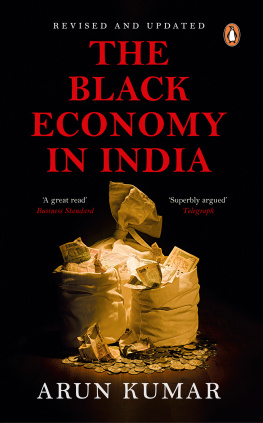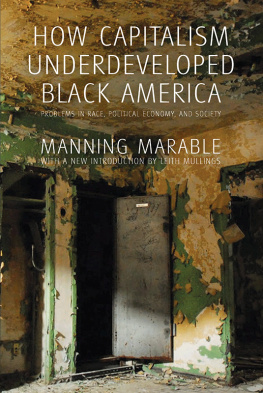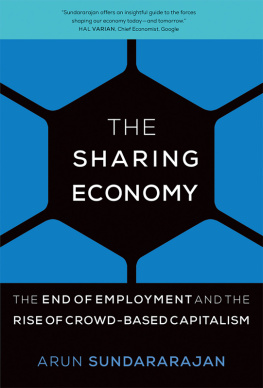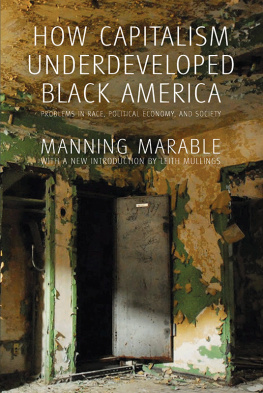UNDERSTANDING THE BLACK ECONOMY AND BLACK MONEY IN INDIA
ALSO BY ARUN KUMAR
The Black Economy in India
Indian Economy Since Independence:
Persisting Colonial Disruption
Challenges Facing Indian Universities (Edited)


ALEPH BOOK COMPANY
An independent publishing firm
promoted by Rupa Publications India
First published in India in 2017
by Aleph Book Company
7/16 Ansari Road, Daryaganj
New Delhi 110 002
Copyright Arun Kumar 2017
The author has asserted his moral rights.
All rights reserved.
The views and opinions expressed in this book are the authors own and the facts are as reported by him, which have been verified to the extent possible, and the publishers are not in any way liable for the same.
No part of this publication may be reproduced, transmitted, or stored in a retrieval system, in any form or by any means, without permission in writing from Aleph Book Company.
ISBN: 978-93-86021-57-1
1 3 5 7 9 10 8 6 4 2
This book is sold subject to the condition that it shall not, by way of trade or otherwise, be lent, resold, hired out, or otherwise circulated without the publishers prior consent in any form of binding or cover other than that in which it is published.
For Neerja, my wife, for being therewhich helped me
understand this subject like nothing else could have
CONTENTS

INTRODUCTION

The sudden announcement by Prime Minister Narendra Modi on 8 November 2016 that 500 and 1,000 notes would no longer be legal tender subjected hundreds of millions of Indians, especially the poorest of the poor, to unnecessary distress. Hundreds of thousands of daily wage earners, shopkeepers and small traders lost their livelihoods, and the countrys economy suffered a major setback. In the weeks that followed, it soon became apparent that the Prime Ministers initiative had not been properly thought through and, worse, was ineffectually implemented. While the mid-term and long-term effects will take time to manifest themselves, there is little doubt in my mind that demonetization should not have been imposed on the country. We will look at what went wrong in greater detail later on in the book. Suffice it to say that the demonetization has had little effect on the problem of the black economy. The irony, of course, is that the reason for the exercise cannot be faulted, for the black economy is the main reason why India continues to be a poor, underprivileged country, all the economic gains of the past few decades notwithstanding.
Indias black economy is estimated to be 62 per cent of GDPgenerating (at 2016-2017 prices) about 93 lakh crore of revenue (or $1.4 trillion). It is larger than the income generated by agriculture and industry put together, which is about 39 per cent of GDP. It is larger than the size of government (centre plus states) spending, which is about 27 per cent of GDP. Because of its existence, the countrys economy has been losing on an average 5 per cent growth (when compared to official figures) since the mid-1970s when the black economy became significant. If we add 5 per cent to the rate of growth over the past four decades or so, the size of our economy would be 1,050 lakh crore (or about $15 trillion at the current rate of exchange) instead of 150 lakh crore (or $2.2 trillion) as it is now. We would have become the worlds second largest economy, behind the US, and a middle-income nation. The per capita income of the country would have been 7.4 lakh (or $11,000) instead of about 1 lakh or ($1,500) as it is at present. In other words, every one of us would have been seven times richer on average.
In the course of this book, we will see how and why the black economy thrives in India, how it holds us back from achieving our potential, where it began, why initiatives like the demonetization of currency do not put a dent in it, and what sort of remedies should be undertaken in the short, medium and long term to root it out.
The book is organized in the following way. presents an analysis of what the black economy is. People think it only has to do with unaccounted income. Others see it as a parallel economy. Those in the West think of it as an informal sector of the economy, which is only true of the advanced countries. This chapter explains why the black economy in developing countries is different from that seen in the advanced economies. This clarity is needed if it has to be measured, its consequences discussed, and remedies proposed.
discusses the reasons why the black economy is bad for India. This chapter looks at the macro- and micro-economic effects of the black economy.
looks at the specifics of the black economys effect on government and civil society.
looks at the underlying causes of the black economy. It goes deep into the various misconceptions about the phenomenon and discusses its origins and historical context.
advised demonetization of currency in 2016. It examines the various suggestions and recommendations made by numerous committees and commissions that have analysed the situation. Despite everything that has been proposed and tried, the black economy has only grown, proving that the causes have not been correctly identified nor the right remedial actions taken.
In conclusion, Ive made the point that there is no magic wand to do away with the black economy in this country. It needs carefully thought through remedies, not populist measures, incorruptible governments with the political will to act and the patience to keep implementing strategies in the mid- and long-term. Only then will India be able to unlock its real potential.
The last time the black economy occupied everyones attention before the 2016 demonetization was in 2011 when a succession of scams surfaced and Anna Hazare and Arvind Kejriwal spearheaded a movement to root out corruption in the country. Another movement with the same objective was subsequently led by Baba Ramdev. In the 2014 general election this issue became central, with the BJP promising to bring back the black money held abroad by wealthy, corrupt Indians. The partys leaders promised that when all this money was brought back, every Indian family would be 15 lakh richer. That has not happened, nor has there been any cessation in the growth of the black economy.
Government Steps to Curb the Black Economy
Since coming to power in 2014, the NDA government has tried various steps to tackle the black economy. Among them are the Black Money (Undisclosed Foreign Income and Assets) and Imposition of Tax Act, 2015; Gold Monetization Scheme, 2015; Income Declaration Scheme (IDS), 2016; Benami Transactions (Prohibition) Amendment Act, 2016, and so on. Despite all this, it has not had much success in dismantling the black economy. We will see later in the book why the efforts of the NDA government, and the governments that have preceded it, have met with extremely limited success.
As I have said, and as I will demonstrate later in the book, the fundamental reason why no government has been able to solve the problem is because the black economy and its causes and effects have not been properly understood. This lack of understanding has meant that even well-meaning efforts to tackle it have failed. The situation that has prevailed, and that continues to prevail, is rather like the parable of the seven blind men and the elephant. One touches the tail and thinks it is a broom, another touches the trunk and thinks it is a hose-pipe, a third touches the legs and thinks they are the pillars of a building. Similarly, various governments, their advisers and civil society leaders have looked at various aspects of the problem, without quite getting to grips with the whole. For instance, a legal committee might think changing the laws would address the problem; NGOs might advocate greater expenditures on essentials, like education; economists might suggest a change in economic policies; and a technology person may suggest use of technologythe general public views all these efforts with cynicism since nothing tried by the government has delivered as yet.
Next page











